Charles E W Bean, Diaries, AWM38 3DRL 606/38B/1 - Notebook - Part 1
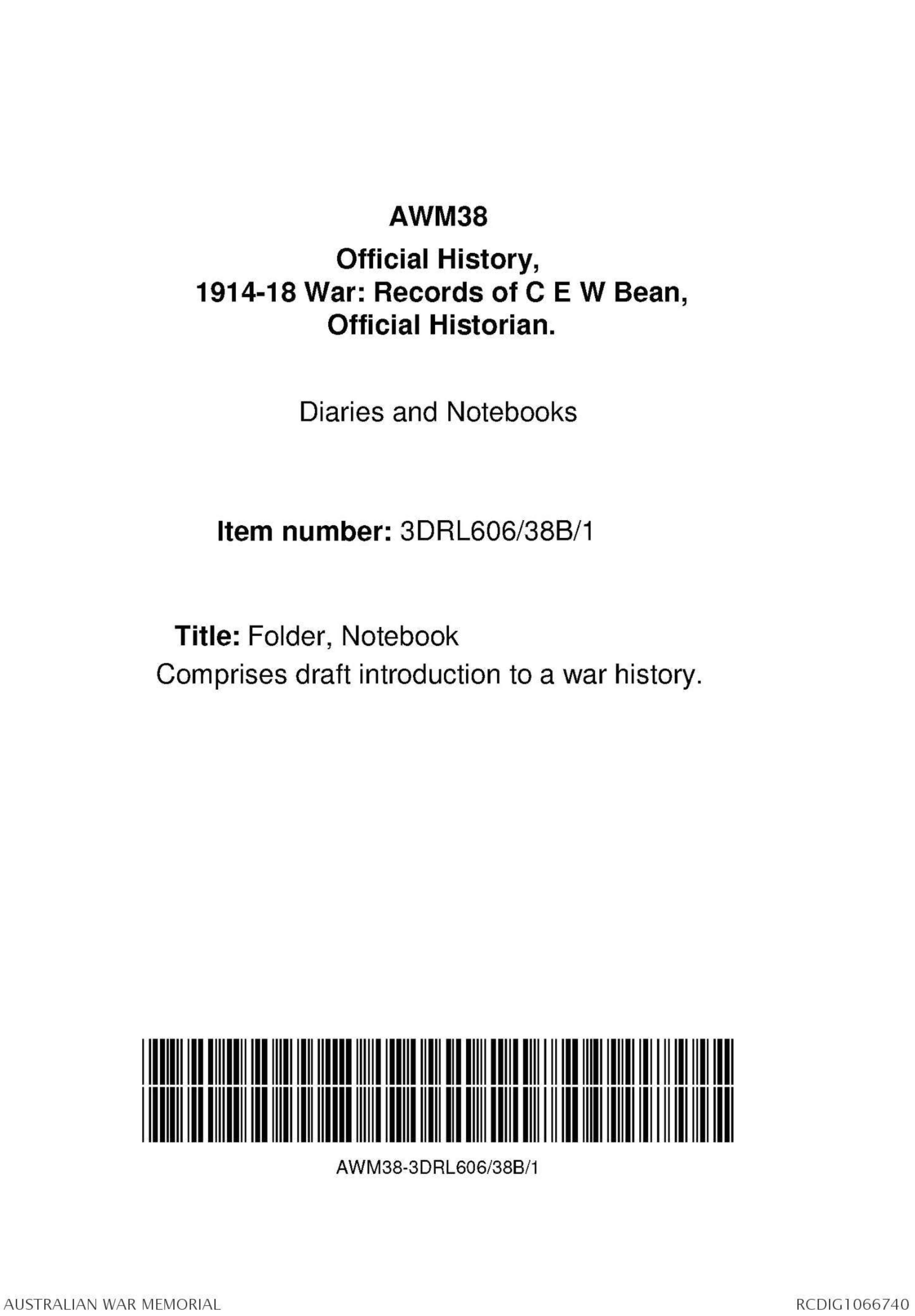
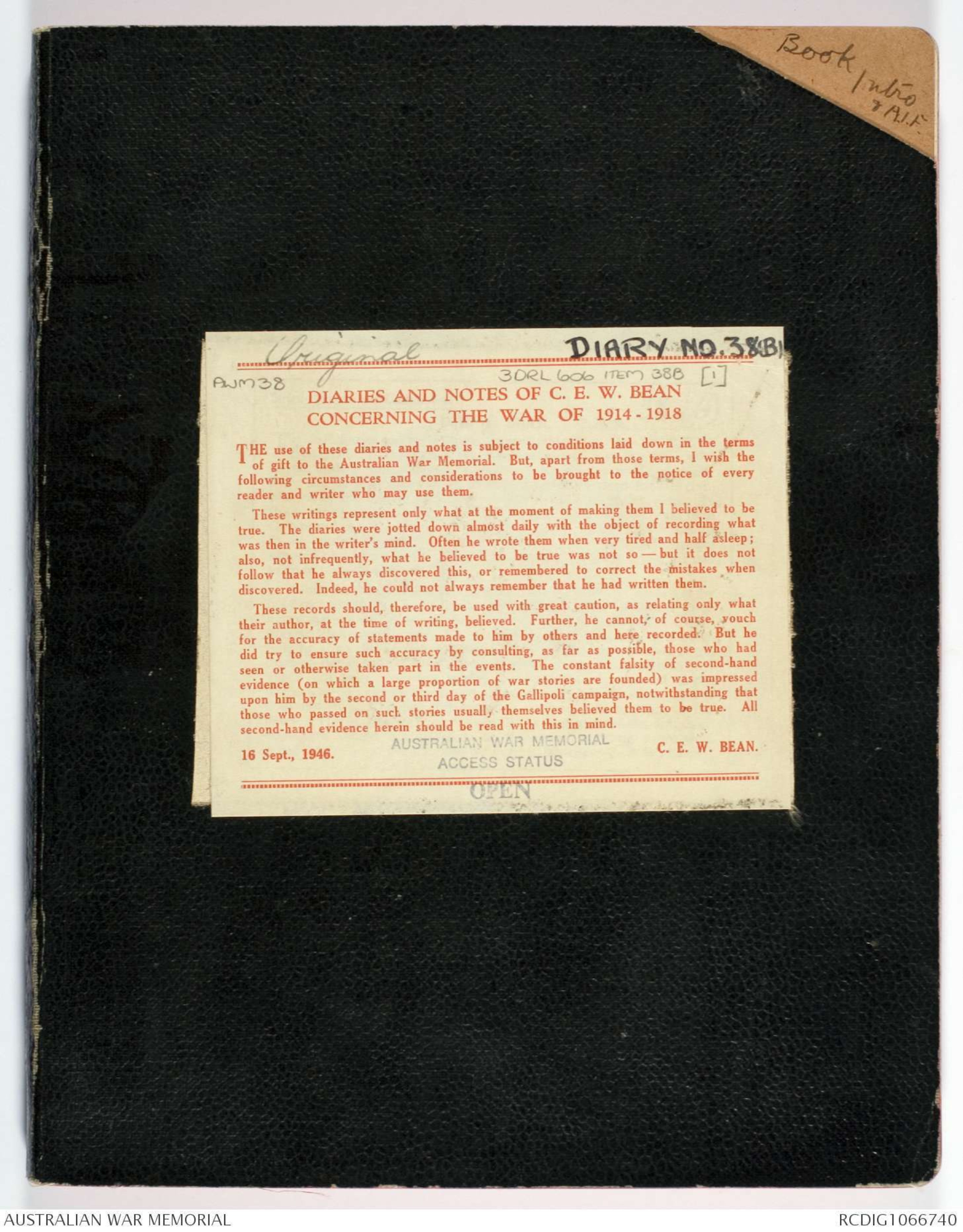
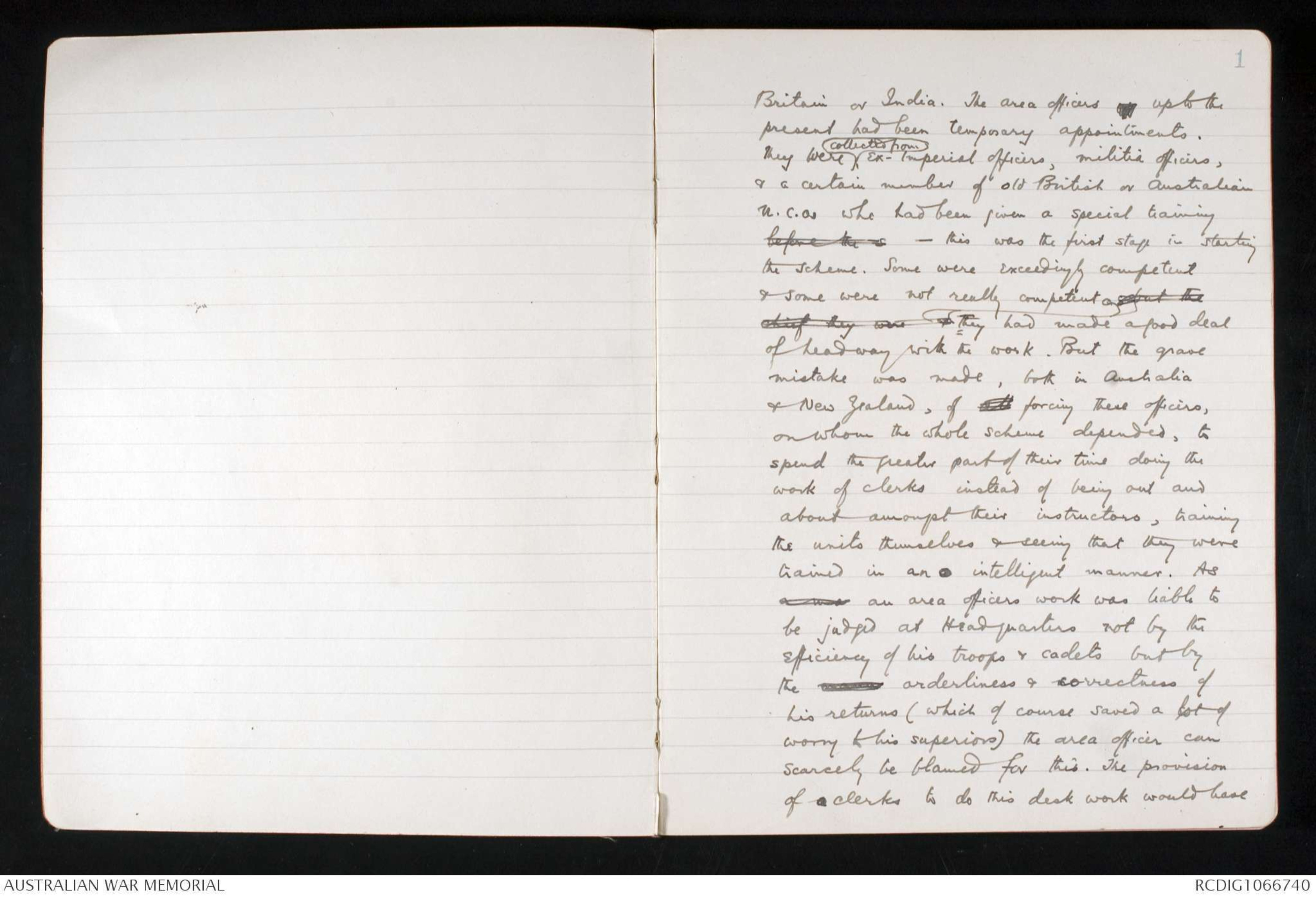
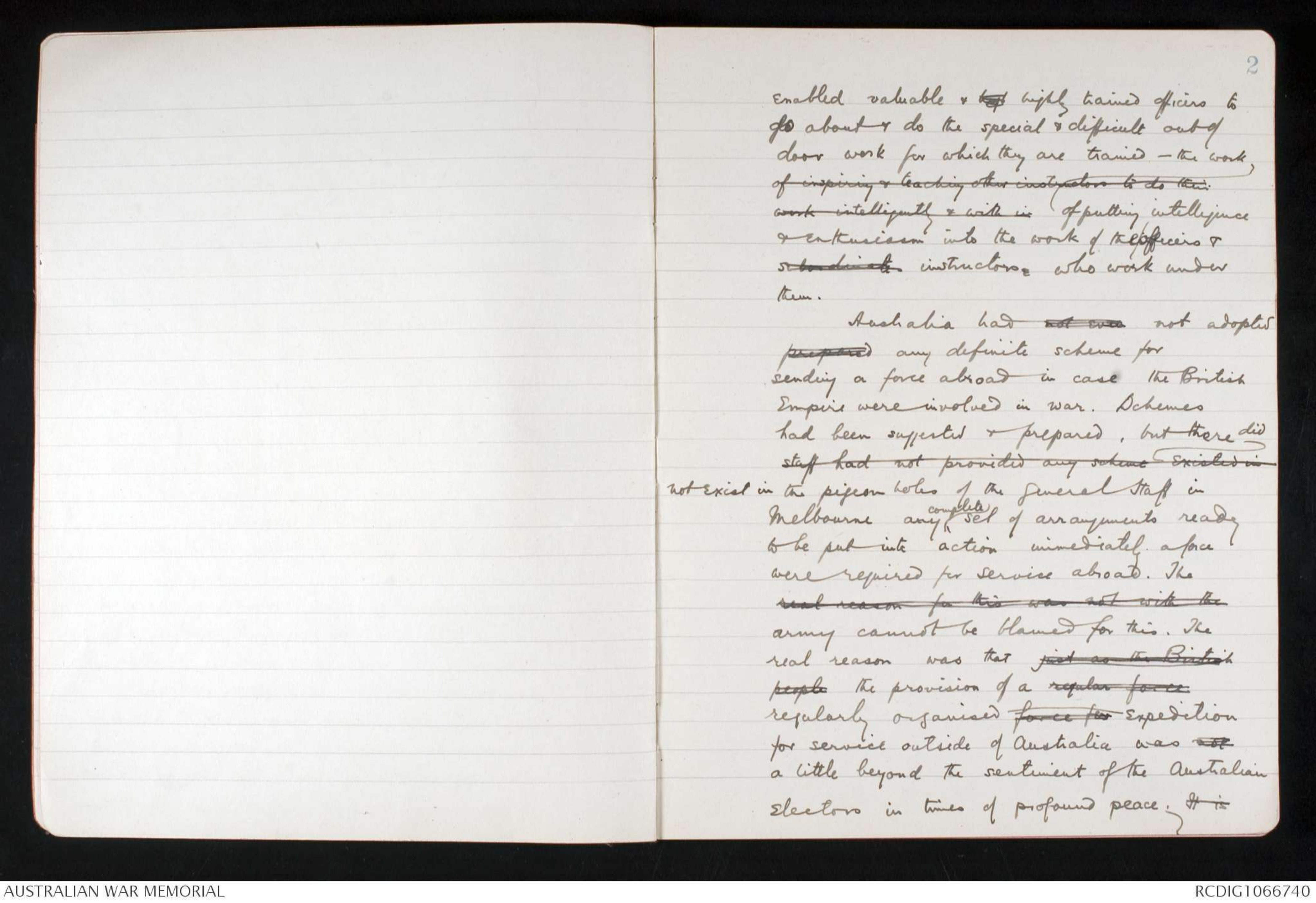
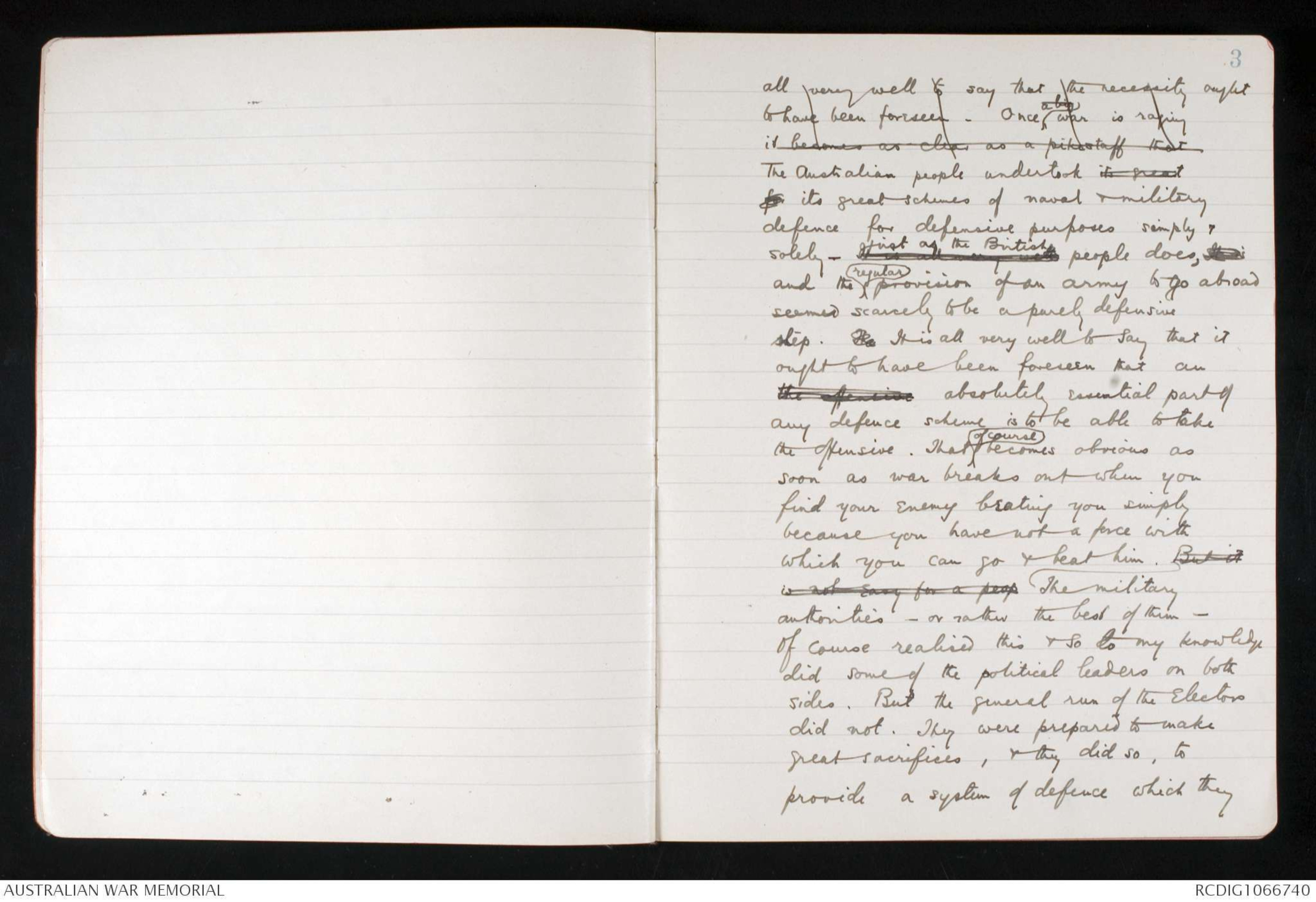
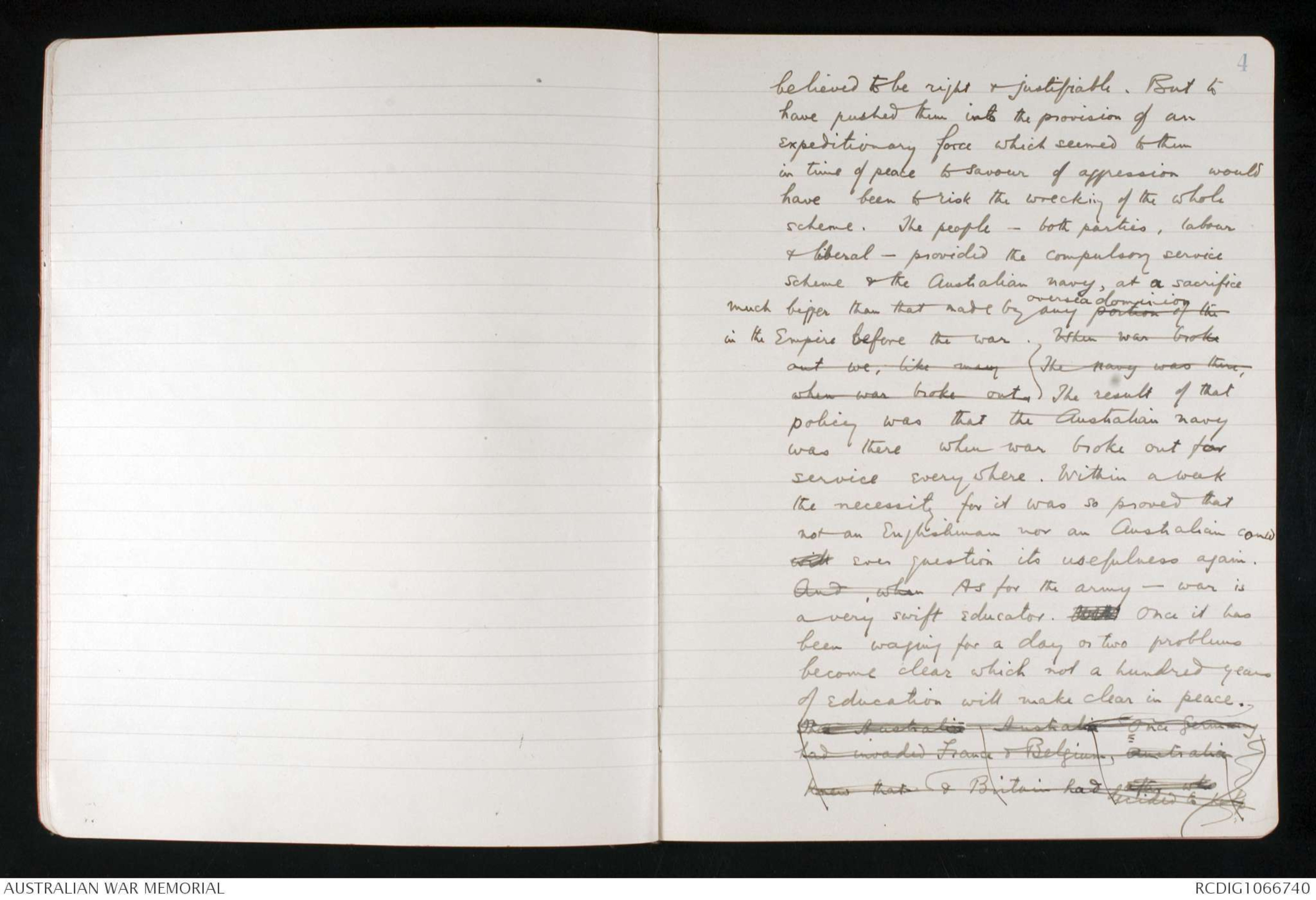
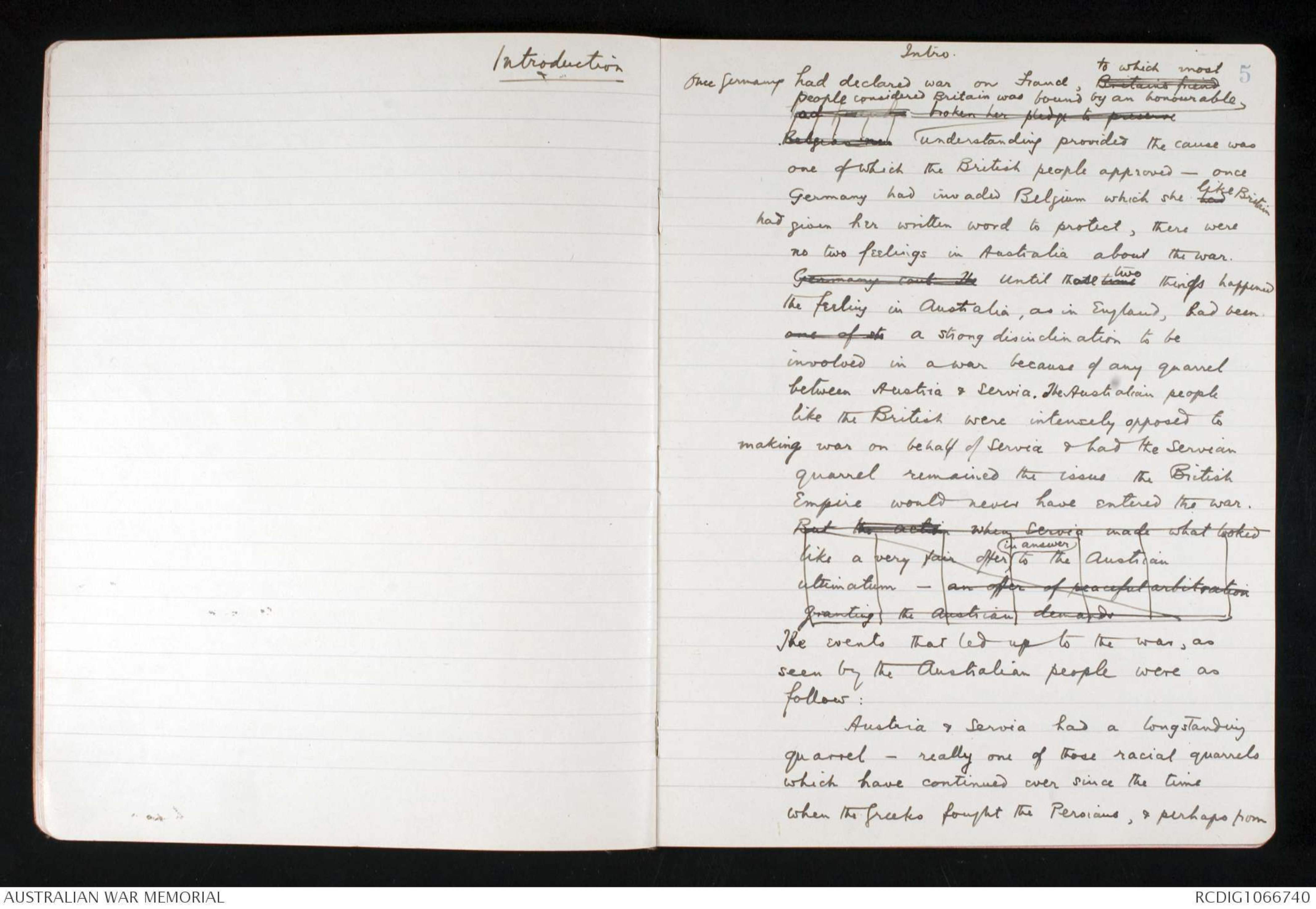
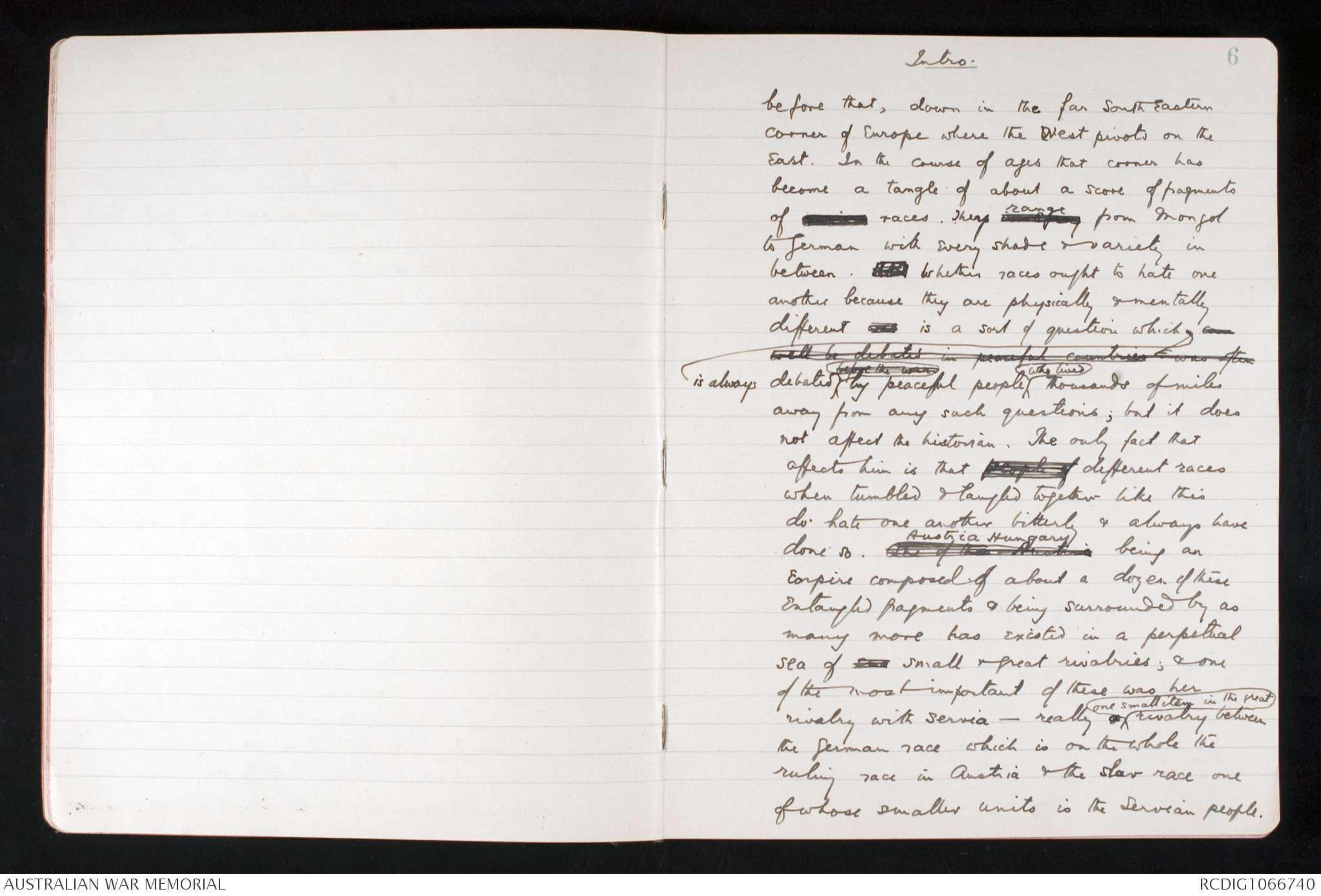
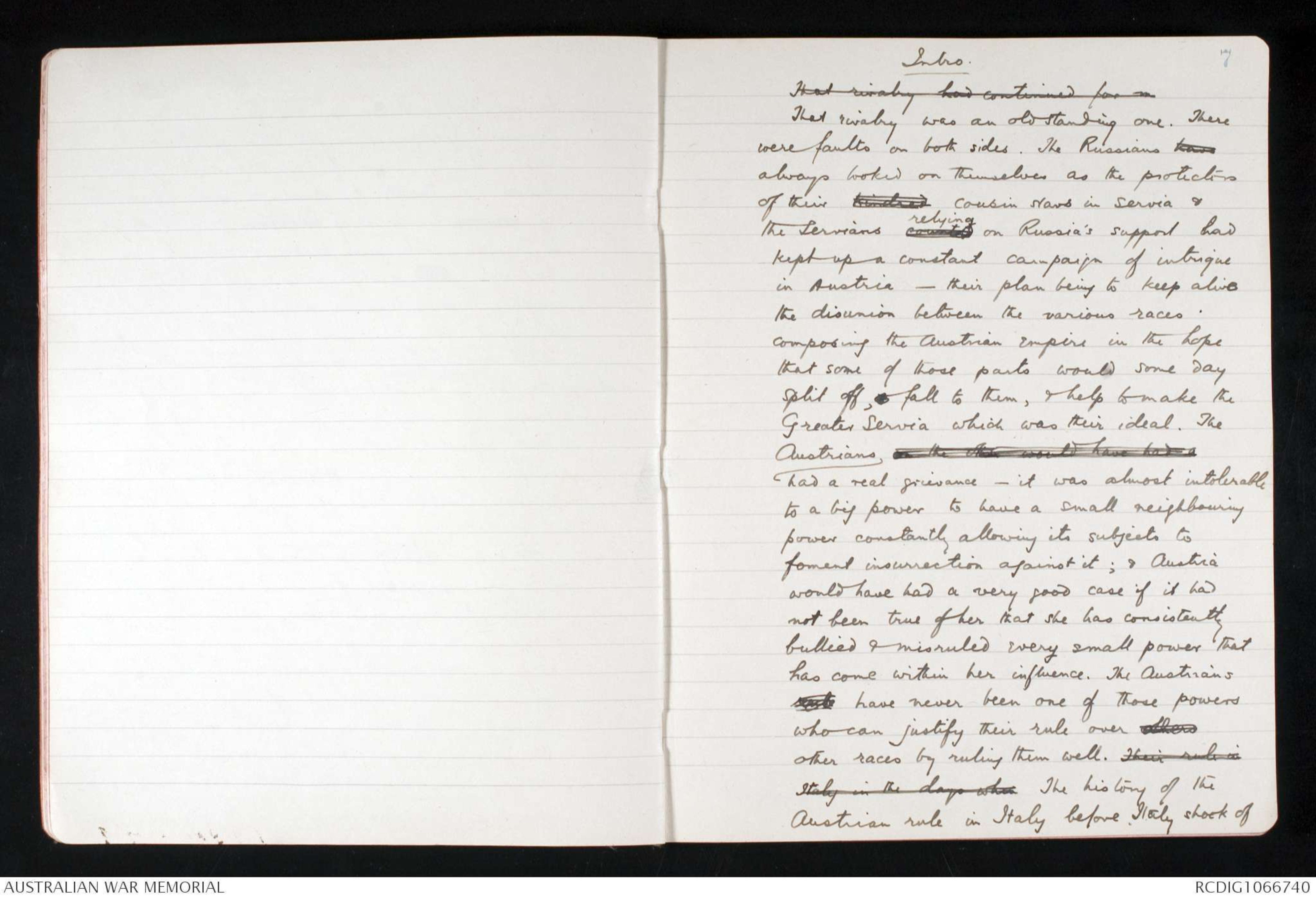
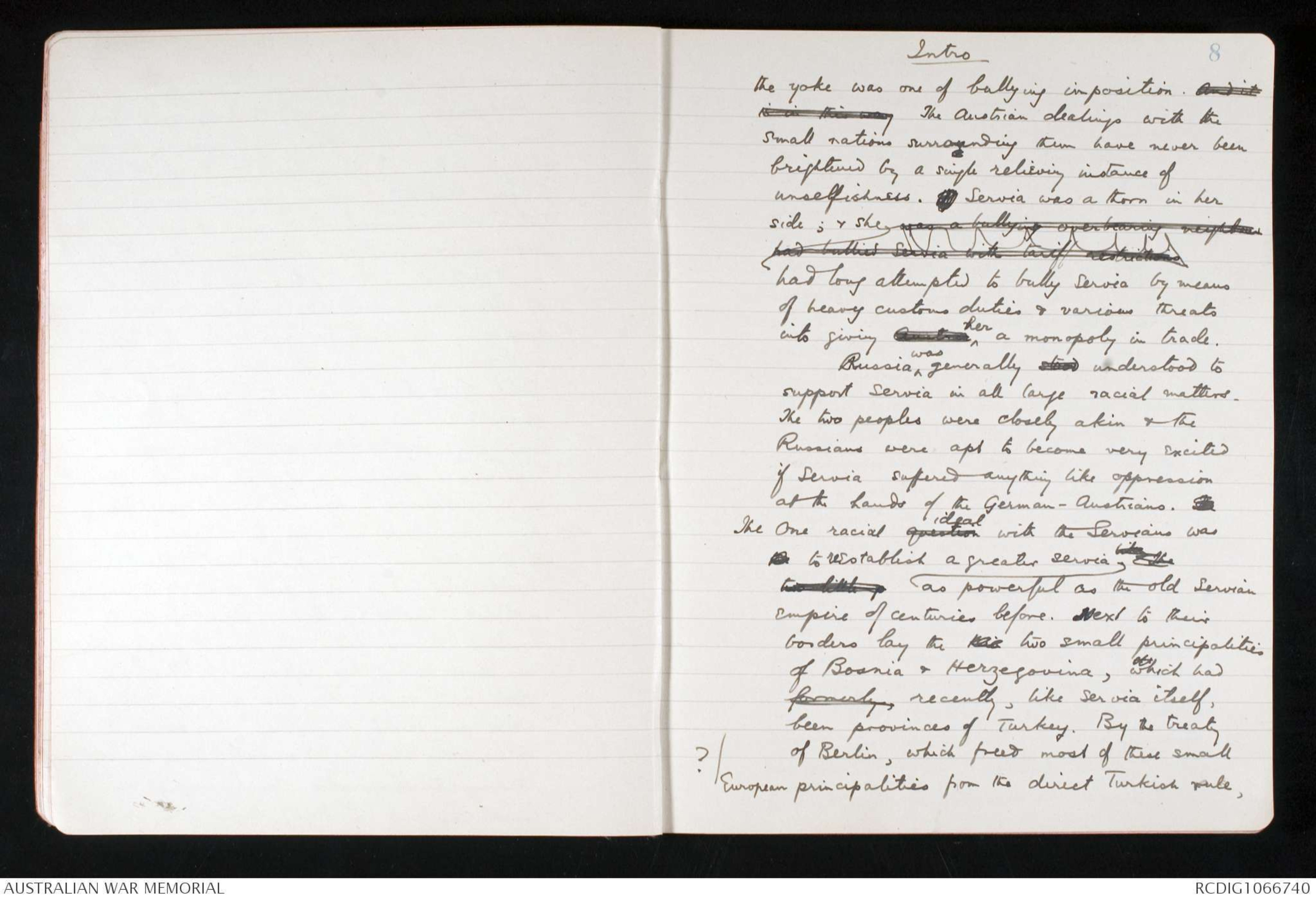
AWM38
Official History,
1914-18 War: Records of C E W Bean,
Official Historian.
Diaries and Notebooks
Item number: 3DRL606/38B/1
Title: Folder, Notebook
Comprises draft introduction to a war history.
AWM38-3DRL606/38B/1
Book Intro
& A.I.F.
Original DIARY NO.38(B)
AWM38 DRL 606 ITEM 38B [1]
DIARIES AND NOTES OF C. E. W. BEAN
CONCERNING THE WAR OF 1914-1918
THE use of these diaries and notes is subject to conditions laid down in the terms
of gift to the Australian War Memorial. But, apart from those terms, I wish the
following circumstances and considerations to be brought to the notice of every
reader and writer who may use them.
These writings represent only what at the moment of making them I believed to be
true. The diaries were jotted down almost daily with the object of recording what
was then in the writer's mind. Often he wrote them when very tired and half asleep;
also, not infrequently, what he believed to be true was not so —but it does not
follow that he always discovered this, or remembered to correct the mistakes when
discovered. Indeed, he could not always remember that he had written them.
These records should, therefore, be used with great caution, as relating only what
their author, at the time of writing, believed. Further, he cannot of course, vouch
for the accuracy of statements made to him by others and here recorded. But he
did try to ensure such accuracy by consulting, as far as possible, those who had
seen or otherwise taken part in the events. The constant falsity of second-hand
evidence (on which a large proportion of war stories are founded) was impressed
upon him by the second or third day of the Gallipoli campaign, notwithstanding that
those who passed on such stories usually themselves believed them to be true. All
second-hand evidence herein should be read with this in mind.
16 Sept., 1946. C. E. W. BEAN.
AUSTRALIAN WAR MEMORIAL
ACCESS STATUS
OPEN
1
Britain or India. The area officers xx up to the
present had been temporary appointments.
They were ^collected from ex-Imperial officers, militia officers,
& a certain member of old British or Australian
N.C.Os who had been given a special trainingbefore the w - this was the first stage in starting
the scheme. Some were exceedingly competent
& some were not really competent xx but thechief they were xx They had made a good deal
of headway with the work. But the grave
mistake was made, both in Australia
& New Zealand, of all forcing these officers,
on whom the whole scheme depended, to
spend the greater part of their time doing the
work of clerks instead of being out and
about amongst their instructors, training
the units themselves & seeing that they were
trained in an x intelligent manner. Asa man an area officers work was liable to
be judged at Headquarters not by the
efficiency of his troops & cadets but by
the xxxxx orderliness & correctness of
his returns (which of course saved a lot of
worry to his superiors) the area officer can
scarcely be blamed for this. The provision
of a clerks to do this desk work would have
2
enabled valuable & kept highly trained officers to
go about & do the special & difficult out of
door work for which they are trained - the workof inspiring & teaching other instructors to do theirwork intelligently & with in of putting intelligence
& enthusiasm into the work of the / officers &subordinates instructors, who work under
them.
Australia had not even not adoptedprepared any definite scheme for
sending a force abroad in case the British
Empire were involved in war. Schemes
had been suggested & prepared, but there didstaff had not provided any scheme existed in
not exist in the pigeon holes of the General Staff in
Melbourne any ^complete set of arrangements ready
to be put into action immediately a force
were required for service abroad. Thereal reason for this was not with the
army cannot be blamed for this. The
real reason was that just as the Britishpeople the provision of a regular force
regularly organised force for expedition
for service outside of Australia was not
a little beyond the sentiment of the Australian
electors in times of profound peace. It is
3all very well to say that the necessity oughtto have been foreseen. Once ^a big war is ragingit becomes as clear as a pikestaff that
The Australian people undertook its greatfor its great schemes of naval & military
defence for defensive purposes simply &
solely - It is all very well just as the British people does, It is
and the ^regular provision of an army to go abroad
seemed scarcely to be a purely defensive
step. The It is all very well to say that it
ought to have been foreseen that anthe offensive absolutely essential part of
any defence scheme is to be able to take
the offensive. That ^of course becomes obvious as
soon as war breaks out when you
find your enemy beating you simply
because you have not a force with
which you can go & beat him. But itis not easy for a peop The military
authorities - or rather the best of them -
of course realised this & so to my knowledge
did some of the political leaders on both
sides. But the general run of the electors
did not. They were prepared to make
great sacrifices, & they did so, to
provide a system of defence which they
4
believed to be right & justifiable. But to
have pushed them into the provision of an
expeditionary force which seemed to them
in time of peace to savour of aggression would
have been to risk the wrecking of the whole
scheme. The people - both parties, labour
& liberal - provided the compulsory service
scheme & the Australian navy, at a sacrifice
much bigger than that made by any portion of the oversea dominion
in the Empire before the war. When war brokeout we, like many The navy was there,when war broke out. The result of that
policy was that the Australian navy
was there when war broke out for
service every where. Within a week
the necessity for it was so proved that
not an Englishman nor an Australian couldwill ever question its usefulness again.And, when As for the army - war is
a very swift educator. xxxxx Once it has
been waging for a day or two problems
become clear which not a hundred years
of education will make clear in peace.The Australia Australia Once Germanyhad invaded France & Belgium, Australiaknew that & Britain after wks haddecided to help
Introduction
5
Intro.
Once Germany had declared war on France, Britain's friend to which most
people considered Britain was bound by an honourablexxx xxxxxx broken her pledge to preserveBelgian neu understanding provided the cause was
one of which the British people approved - once
Germany had invaded Belgium which she had like Britain
had given her written word to protect, there were
no two feelings in Australia about the war.Germany cant The until those two time things happened
the feeling in Australia, as in England, had beenone of sta a strong disinclination to be
involved in a war because of any quarrel
between Austria & Servia. The Australian people
like the British were intensely opposed to
making war on behalf of Servia & had the Servian
quarrel remained the issue the British
Empire would never have entered the war.But the action when Servia made what lookedlike a very fair offer ^in answer to the Austrianultimatum - an offer of peaceful arbitrationgranting the Austrian demands -
The events that led up to the war, as
seen by the Australian people were as
follow:
Austria & Servia had a longstanding
quarrel - really one of those racial quarrels
which have continued ever since the time
when the Greeks fought the Persians, & perhaps from
6
Intro.
before that, down in the far South Eastern
corner of Europe where the West pivots on the
East. In the course of ages that corner has
become a tangle of about a score of fragments
of various races. They xxxxx range from Mongol
to German with every shade & variety in
between. xxx Whether races ought to hate one
another because they are physically & mentally
different was is a sort of question which canwell be debated in peaceful countries was often
is always debated ^before the war by peaceful people ^who lived thousands of miles
away from any such questions; but it does
not affect the historian. The only fact that
affects him is that people of different races
when tumbled & tangled together like this
do hate one another bitterly & always have
done so. One of them - Austria Austria Hungary being an
Empire composed of about a dozen of these
entangled fragments & being surrounded by as
many more has existed in a perpetual
sea of sma small & great rivalries; & one
of the most important of these was her
rivalry with Servia - really a ^one small item in the great rivalry between
the German race which is on the whole the
ruling race in Austria & the slav race one
of whose smaller units is the Servian people.
7
Intro.That rivalry had continued for m
That rivalry was an old standing one. There
were faults on both sides. The Russians have
always looked on themselves as the protectors
of their kindred cousin slavs in Servia &
the Servians counted relying on Russia's support had
kept up a constant campaign of intrigue
in Austria - their plan being to keep alive
the disunion between the various races
composing the Austrian Empire in the hope
that some of those parts would some day
split off, & fall to them, & help to make the
Greater Servia which was their ideal. The
Austrians on the other would have had a
had a real grievance - it was almost intolerable
to a big power to have a small neighbouring
power constantly allowing its subjects to
foment insurrection against it; & Austria
would have had a very good case if it had
not been true of her that she has consistently
bullied & misruled every small power that
has come within her influence. The Austriansstate have never been one of those powers
who can justify their rule over others
other races by ruling them well. Their rule inItaly in the days when The history of the
Austrian rule in Italy before Italy shook off
8
Intro
the yoke was one of bullying imposition. And itis in their way The Austrian dealings with the
small nations surrounding them have never been
brightened by a single relieving instance of
unselfishness. xx Servia was a thorn in her
side; & she was a bullying, overbearing neighbourhad bullied Servia with tariff restrictions
had long attempted to bully Servia by means
of heavy customs duties & various threats
into giving Austria ^her a monopoly in trade.
Russia ^was generally stood understood to
support Servia in all large racial matters.
The two peoples were closely akin & the
Russians were apt to become very excited
if Servia suffered anything like oppression
at the hands of the German - Austrians. The
The one racial question ideal with the Servians wasxx to reestablish a greater Servia like Thetwo little p as powerful as the old Servian
empire of centuries before. Next to their
borders lay the thre two small principalities
of Bosnia & Herzegovina, which hadformerly recently, like Servia itself,
been provinces of Turkey. By the treaty
of Berlin, which freed most of these small
[*?/*]
European principalities from the direct Turkish rule,
 Deb Parkinson
Deb ParkinsonThis transcription item is now locked to you for editing. To release the lock either Save your changes or Cancel.
This lock will be automatically released after 60 minutes of inactivity.